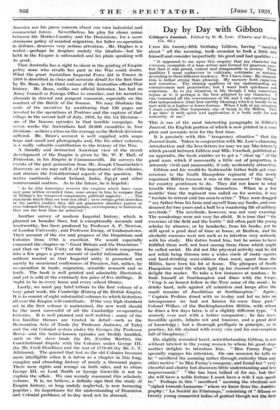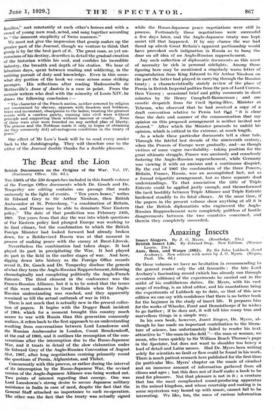Day by Day with Gibbon Gibbon's Journal. Edited by D.
M. Low. (Chatto and Windt's,
17s. 6d.) . .
UPON his twenty-fifth birthday Gibbon, having "rambled about" all the morning, took occasion to .look a little into himself and consider impartially his good and bad qualities :— "It appeared to me upon this enquiry that my character was virtuous, incapable of a base action and formed for generous ones ; but that it was proud, violent and disagreeable in society. These qualities I must endeavour to cultivate, extirpate, or restrain, according to their different tendency. Wit I have none. My imagine. tion is rather strong than pleasing. My memory both capacious and retentive. The shining qualities of my understanding are extensiveness and penetration, but I want both quickness and exactness. As to my situation in life though I may sometimes repine at it, it perhaps is the best adapted to my character. I can command all the conveniences of life and I can command to that independence (that first earthly blessing) which is hardly to be met with in a higher or lower fortune. When I talk of my situation I must exclude that temporary one of being in the Militia. Tito' I go thro' it with spirit and application it is both unfit for and unworthy of me." - This is one of the most interesting paragraphs in Gibbons Journal, the English portion of which is now printed in a corn- plete and accurate text for the first time.
It is precisely with this "temporary situation" that the Journal deals. Taken in conjunction with Mr. Low's charming introduction and the love-letters (or may we say like-letters?) which passed between Gibbon and Mlle. Curchod, published as an appendix, the book enables us to get a "close up" of the great man, which if necessarily a little out of proportion, is intensely vivid and memorable, if only moderately attractive.
Gibbon and his would-be fashionable father both got com- missions in the South Hampshire regiment of the newly organized Militia because it was at the moment "the thing" for country gentlemen to do. They did not know in what trouble they were involving themselves. When in a few months' time the regiment was called on for service, it was "too late to retreat and too soon to retire." They were dragged "my father from his farm and myself from my books, and con- demned for two years and a half to a wandering life of military servitude." The servitude, however, was not very exacting. The wanderings were not very far afield. It is true that "the exercises of the field and the bottle" did often part the young scholar by absence, or by headache, from his books, yet he still spent a good deal of time at home, at Beriton, and his alcoholic excesses were not such as to interfere very seriously with his study. His duties bored him, but he seems to have fulfilled them well, not least among them those which might be called social. He did not like physical activity and he did not relish being thrown into a wider circle of rustic squires and bard-drinking semi-soldiers than must, apart from the Militia, have been his lot at home. The glimpses of South Hampshire rural life which light up his Journal will however delight the reader. To take a few instances at random : he finds himself at Southampton and dines with the Crops. "Crop is an honest fellow in the Tory sense of the word ; he drinks hard, rails against all ministers and keeps alive the small remains of Jacobitism at Southampton." Again : "Captain Perkins dined with us to-day and led us into an intemperance we had not known for some time past." Colonel Wilkes, of the Buckinghamshire Militia, with whom he dines a few days later, is of a slightly different type. "'I scarcely ever met with a better companion ; he has inex- haustible spirits, infunte wit and humour, and a great deal of knowledge ; but a thorough profligate in principle, as in practice, his life stained with every vice and his conversation full of blasphemy."
His slightly wounded heart, notwithstanding Gibbon, is not without interest in the young women to whom his good step- mother delights to introduce him. "Miss Fanny Page" specially engages his attention. On one occasion he tells us he "sacrificed the morning rather :through curiosity than any other motive 7 to Miss Fanny's company, and found her " very chearful and chatty but discovers little understanding and less improvement." "She has been talked of for me, but tho' she will have a noble fortune I must have a wife I can speak to." Perhaps in. this " sacrificed " morning the obedient son "sighed towards Lausanne "where we know from the Autobio- graphy "La Societe du Printemps," consisting of " fifteen or twenty young unmarried ladies of genteel though not the first
families,-" met constantly at each other's houses and with a crowd of young men read, acted, and sang together according to "the innocent simplicity of Swiss manners." '
We must not give the impression that gossip makes up the greater part of the Journal, though we venture to think that gossip is by far the best part of it. The great man, as yet un- conscious of his destiny, describes in detail the gradual creation of the historian within his soul, and confides his incredible
industry, the breadth and depth of his studies. We hear of laborious days, spent between reading and soldiering, in the untiring pursuit of duty and knowledge. Even in this some- what dry portion of the book we come across some striking passages. His reflections after reading Mademoiselle de
Mottesville's Anne of Austria is a case in point. From the
memoir writers who deal with the minority of Louis XIV. he draws the following conclusion :—
" The character of the French nation, neither sowered by religion nor constrained by slavery, appears with freedom and boldness, brave and inconstant, obsequious to the ladies, treating the greatest events with a careless gaiety, running into civil wars without principle and supporting them without rancour or cruelty. None of these wars ever were founded on any settled plan of liberty. The princes and the Noblesse made it only in hopes of obtaining (as they commonly did) advantageous conditions in the treaty of peace.'
One effect of Mr Low's book will be to send every reader back to the Autobiography. They will therefore owe to the editor of the Journal double thanks for a double pleasure.











































 Previous page
Previous page